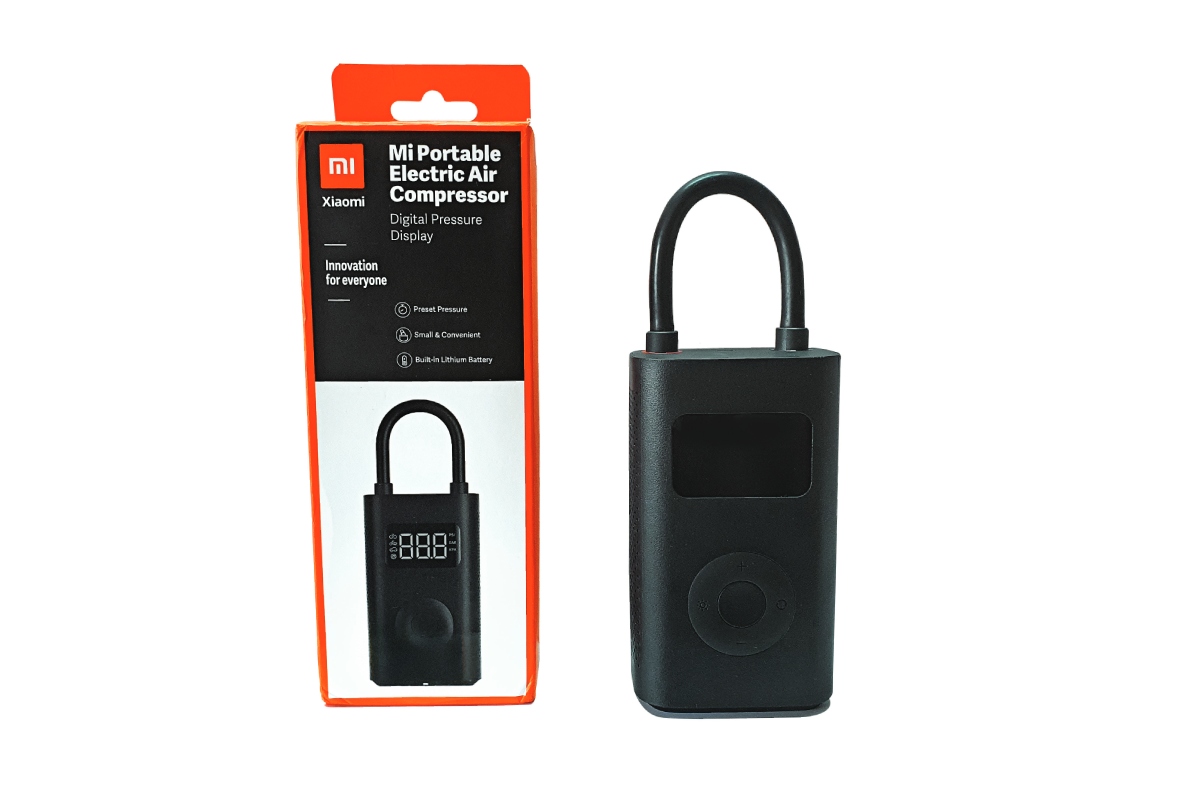
The Mi Portable Electric Air-Compressor comes with an in-built 2,000mAh Li-Ion battery, which means it doesn’t need to draw power from your motorcycle’s battery. As with most products from Chinese brand Xiaomi, its sleek appearance is definitely a selling point. Constructed in high-quality and durable-feeling plastic, this compressor weighs just 430gm, which is impressive. Perforations along both sides help dissipate heat, while the air is pumped out of a flexible hose that is bent into a U-shape and slots back into the device on the left-hand side. Provided in the box is a cloth carry bag, a micro- USB charging cable (but no charger) and two additional valves to fill bicycle tyres or foot/basketballs.
To turn the device on, you simply have to pull the hose out of the left side, which is marked with a red ring. This hose has a rotary attachment that screws onto the tyre’s valve. Once firmly screwed in, the big LCD display shows the current tyre pressure; the gauge accuracy is quoted at ±2PSI. This system is very easy to use and has negligible air leakage when the hose is unscrewed.
The middle button in the iPod-style circular array starts or stops the compressor, while the top and bottom buttons increase/decrease the desired air pressure. The right side button scrolls between four modes (bicycle, motorcycle, car and sports ball) and you can select either PSI, bar or kPA units. On the left side of the circle is a button that activates a small LED light positioned near the hose outlet.
Charging the device from empty took about three hours and this is where I wish it had a proper battery indicator. Instead, there’s a small light at the base of the device that glows white to signify over 50 percent charge, orange for 20-50 percent and red for less than 20 percent.
In operation, the device is loud, but not unreasonably so. After about 6min spent, collectively, topping up about 10PSI in both tyres on the 790 Duke, the compressor was warm, but not hot; although the hose gets surprisingly toasty. You can preset desired pressures and the pump will cut off automatically on reaching it.
After topping up both tyres, I emptied the 180-section rear tyre and refilled it to 38PSI. This took around 13.5min, by which point, the battery light flashed orange. Xiaomi says it can fill five car tyres, but doesn’t specify how big these tyres are. Nevertheless, it can easily handle at least two flat tyres, which should be plenty for most folks.
What I’d like to see improved is a more flush placement of the hose to avoid any potential kinking when the device is tossed into a bag. Not knowing the exact battery level is a pain too, but the biggest issue to me is that it cannot be run directly off a power supply and only works when the battery is holding charge. That means you must remember to charge it before a ride, and I also suspect there might be issues using it in extreme cold (think Ladakh) – conditions where lithium-ion batteries can lose their charge fast.
At Rs 2,499, it costs more than double of what you’d pay for a decent-quality conventional air-compressor that runs off a motorcycle battery. Then again, this is also a more advanced and attractive device, in general. The quality is the best I’ve seen so far, and if the above-mentioned negatives aren’t a worry for your intended usage pattern, you’ll enjoy what this compressor has to offer.
Where: www.store.mi.com
Price: Rs 2,499
from Autocar India - Bikes https://ift.tt/34uTWXw

0 comments:
Post a Comment